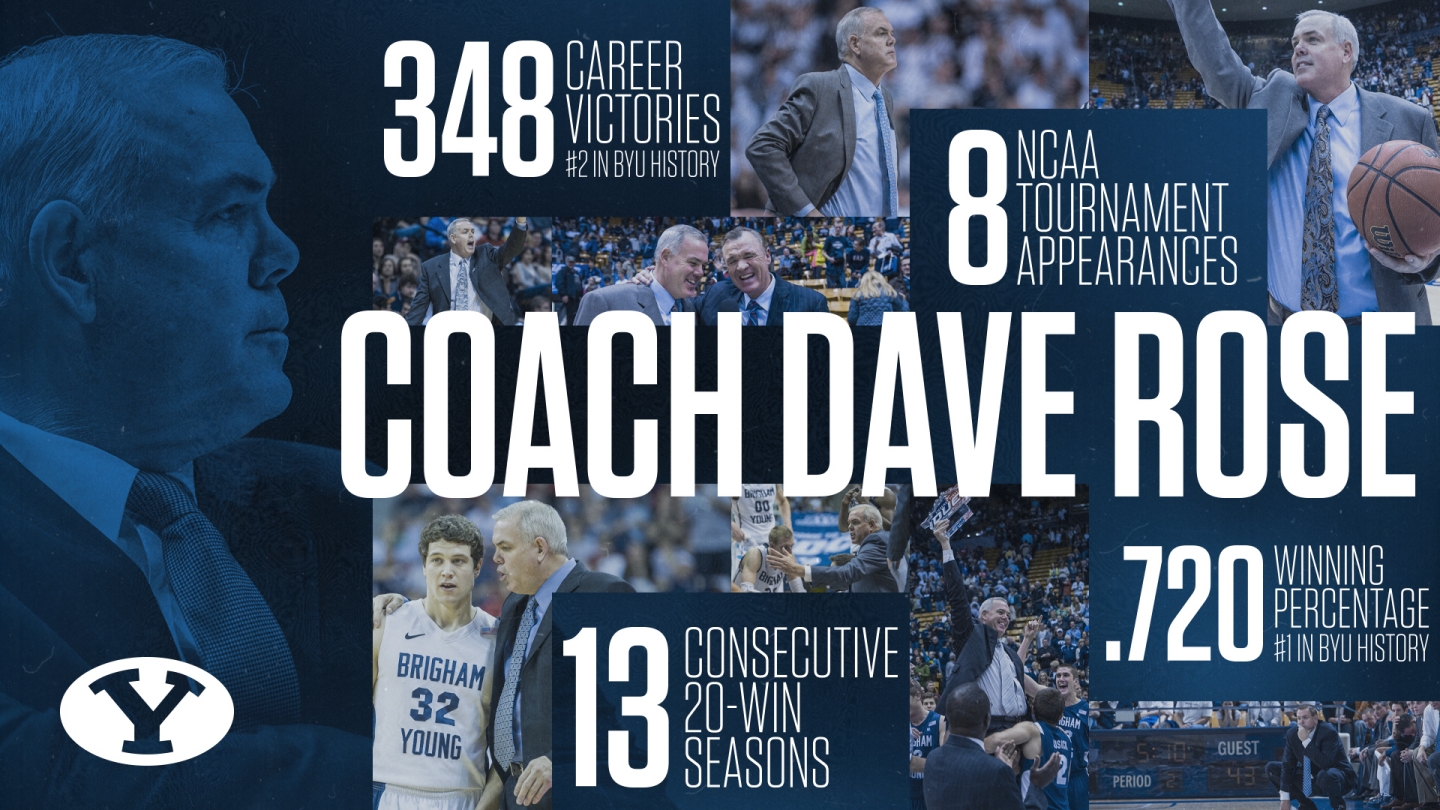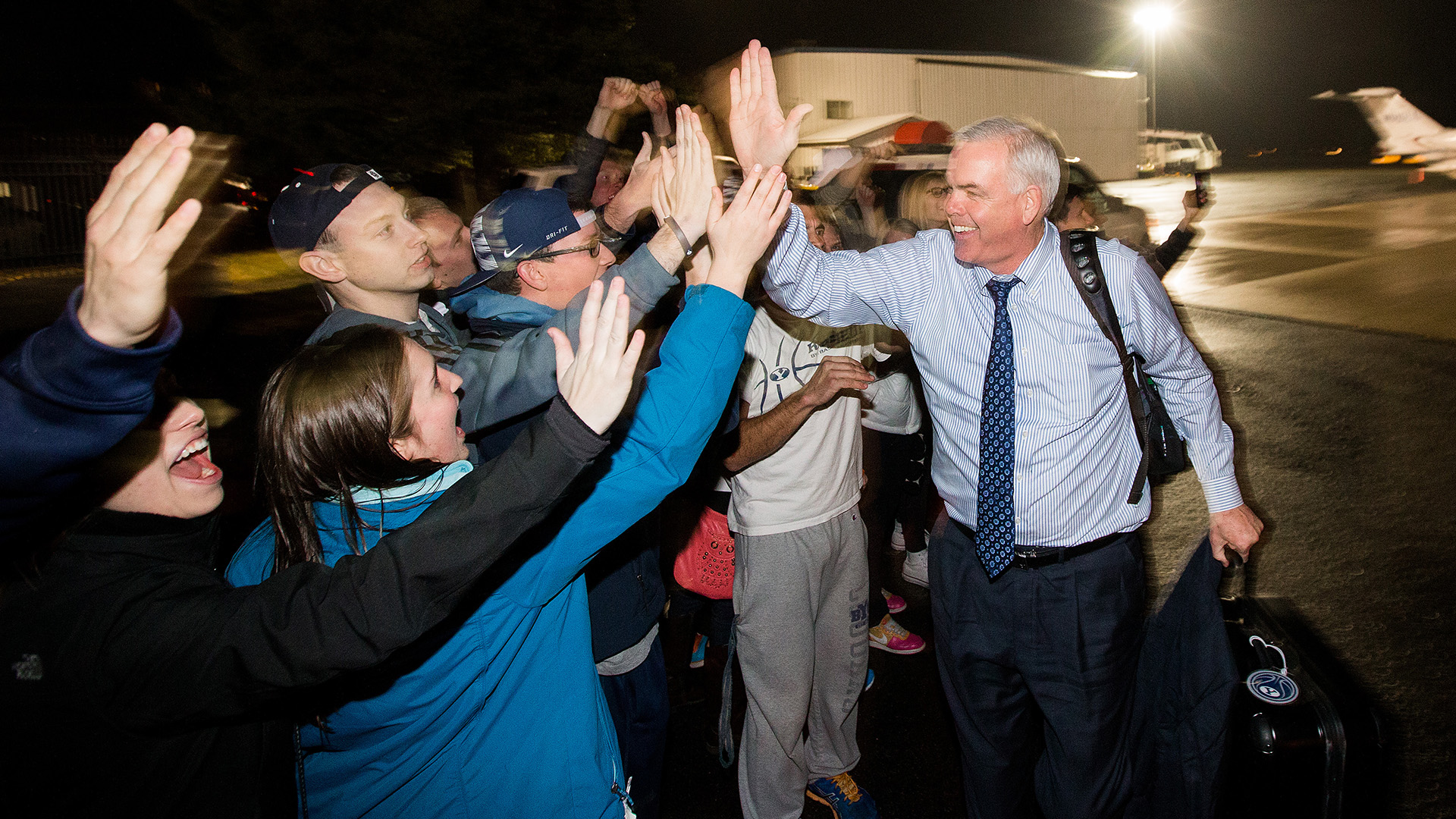
Dave Rose announces retirement from BYU



PROVO, Utah – BYU men’s basketball Dave Rose today announced he is retiring from coaching at BYU after 22 years, including 14 seasons as head coach. Rose served as an assistant coach on Steve Cleveland’s staff from 1997-2005, before taking over the program prior to the 2005-06 season.
"Thirty-six years, thirty-six years I’ve been doing this," Rose said at a press conference today on the Marriott Center floor where he announced his retirement. "Twenty-two at BYU, 14 as the head coach. And today’s the day I’m going to retire. I’ve had a chance to talk with the players and encourage them to move forward and tackle the challenge that’s at hand. But most of all, I’ve had a chance to reflect with my family how lucky I’ve been. I’m 61-years old, I still haven’t worked a day in my life. I’ve gotten to play, play with so many great players, coached so many great players, so many great teams. That’s probably what I’ll miss the most. I’ll miss the most when we get to the end of June and it’s time to start summer semester and the team moves on and I’ll be on another team. I’ll be on a team with my wife, with Cheryl, with our grandkids, and we’ll make that just as good as we made this."
Over the past 14 years, Rose guided the Cougars to a record of 348-135, including eight trips to the NCAA Tournament and five bids to the National Invitational Tournament (NIT). Rose also won four conference titles, was named conference coach of the year three times and led BYU to 13 20-win seasons and eight 25-win seasons. He retires as BYU’s all-time leader in winning percentage at 72.0 and is second all-time in victories at 348.
In addition to the team success Rose and the Cougars achieved, his players collected numerous accolades. Jimmer Fredette was the nation’s scoring leader and the 2011 Consensus National Player of the Year and he and five other players received All-America recognition under Rose. Five players were named conference player of the year under Rose and 13 players collected 22 first-team all-conference honors.
“Dave has been an outstanding coach at BYU and is recognized in the profession by his peers as one of the best during his tenure,” BYU athletic director Tom Holmoe said. “His teams have enjoyed a great deal of success at both the conference and national level and his legacy will long be remembered. Excellent players and teams under his leadership established many program records. We wish Dave and his wife Cheryl the very best as they begin the next chapter in their life. They will always be a part of the Cougar Family.”
In his first season as head coach, Rose and his staff produced the nation's second-most improved team by turning a 9-21 squad into a 20-9 NIT qualifier and 12-4 second-place Mountain West Conference finisher in 2005-06. Under his tutelage from 2007 to 2009, the Cougars won three-straight MWC championships and at-large bids to the NCAA tournament each season. In 2010, BYU set a then-program record with 30 victories and defeated Florida in the first round of the NCAA tournament, the program's first tournament victory since 1993.
In 2010-11, Rose and the Cougars won a program-record 32 games, a fourth conference title in five seasons and were ranked in the top 10 for nine-straight weeks, including a No. 3 ranking in both the AP and the ESPN/USA Today Coaches polls. BYU received a No. 3 seed in the NCAA tournament and reached the Sweet 16 for the first time since 1981.
Rose led BYU back to the NCAA tournament in 2012 where the Cougars overcame a 25-point deficit to defeat Iona in the first round. The comeback set the record for the biggest comeback in NCAA tournament history. It also marked a program record as the Cougars won in the NCAA tournament for a third-straight season.
Under Rose’s guidance, BYU continued to rack up 20-win seasons and postseason invites as the Cougars advanced to the semifinals of the NIT in 2013 and returned to the NCAA tournament in 2014 and 2015. From 2016 to 2018, Rose’s teams won 20-plus game and received bids to the NIT.
As an assistant coach under Steve Cleveland from 1997 to 2005, Rose helped rebuild the Cougar program after a 1-25 season in 1995-96. During his eight years on Cleveland’s staff, Rose helped BYU win two conference titles and earn five postseason invites – three NCAA tournament bids and two to the NIT.
In addition to his on-court success, Rose has made an impact in the community during his time in Provo. Since his first year as an assistant, Rose, his wife Cheryl and the team have been involved with the Mac’s Gift Foundation. The team participates in the annual party for families of children with cancer and Dave and Cheryl have served in leadership positions with the foundation for several years.
The fight against cancer became more personal for Rose when he was diagnosed with pancreatic neuroendocrine tumor cancer in June 2009. Since that time, Rose has served on the National Coaches vs. Cancer Council and has lobbied before Congress for more funding for cancer research.
In 2018, Rose won the ESPN INFINITI Coaches’ Charity Challenge to raise more than $100,000 for the BYU Simmons Center for Cancer Research. In September 2018, the Simmons Center used those funds to create the David and Cheryl Rose Family Student Cancer Research Endowment, a fellowship for BYU students conducting cancer research.
A national search for the program’s next head coach will begin immediately. Quincy Lewis, who has been an assistant coach at BYU since 2015, will serve as interim head coach.
More from Rose
"I’ve always felt like these are all numbers, just numbers on a page. People tell me that they’re at times pretty impressive numbers. But what I’ll always remember are the players, the relationships that I’ve had with the guys, the coaches, that’s one of the things I’ll really miss – these coaches are my best friends and they have been. I’ve talked to every one of the coaches that have worked for me this morning over the years. I can’t thank those guys enough."
"I’ve got a couple things that I want to say. One is, how did this happen and how did it comes to this? I’ve had 10 years of what some doctors have said, ‘You’re playing on house money.’ And the house money’s been pretty good to me. I kind of have three coaching pillars for me. One is my mind, a coaching mind, my body, my physical body, a coaching body, and then what I consider a coaching soul, which is my heart. My mind I fought for years. You get tired, you get frustrated, you get mad, you can’t figure things out, and I’ve always been able to talk my mind back into it’s time to accept the next challenge; let’s get the next team, let’s go. My body would be tired at times but I could always get myself up and get going. And make my body do it. But it’s my coaching soul that has put me here today. I always tell everybody: you can’t trick how you feel. You can pretend, you can ignore it, but you know inside how you feel. And my coaching soul said it was time, time to be done."
















